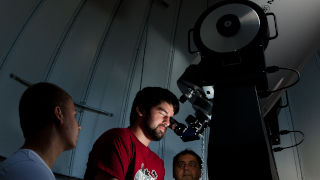NJSGC 2022-23 Academic Year Research Fellowships - Seton Hall University
Thursday, September 22, 2022

For 2022-2023 Academic Year, Seton Hall University has been awarded two academic year fellowships for science, engineering, or mathematics (STEM) undergraduate students by the New Jersey Space Grant Consortium (NJSGC), a NASA-sponsored program.
Background
The New Jersey Space Grant Consortium was established in 1991 by a grant from NASA.
The objectives of the Consortium are to develop programs to further aerospace and
STEM education, research, and development in New Jersey. For the 2022-2023 Academic
Year, NJSGC has awarded Seton Hall University two Academic Year Student Research Fellowships
to administer.
Fellowship Details
- The fellowship recipient must conduct research relevant to Science, Technology, Engineering and Mathematics (STEM) or aerospace and fit into one of NASA’s missions as outlined in their website.
- The fellow must be a full-time student at Seton Hall. A faculty member in the University has to agree to supervise the research of the fellow.
- Seton Hall University has two fellowships to award in 2022-2023 academic year. The fellowship amount is $2,000 per student.
- The fellowship amount is only for the stipend of the student.
- By NASA mandate, only U.S. citizens are eligible
- Underrepresented minorities are especially encouraged to apply.
Application Process
- Application deadline is October 21, 2022.
- Interested students should submit their application by October 21, 2022. The application should include the completed application form and a one-page research project description from the student with the approval of faculty supervisor for the project. Applications will be reviewed by a committee formed by the faculty of the science departments at Seton Hall. By NASA mandate, only U.S. citizens are eligible. Underrepresented minorities are especially encouraged to apply.
Award Procedures and Requirements
- Each fellowship recipient is required to write a 1,000 word report outlining the research that they have conducted after the conclusion of the project.
- NJSGC must be properly acknowledged in any publication, presentation, or poster session involving the research.
- NASA requests NJSGC to conduct longitudinal tracking of its fellowship recipients. The fellow will be asked to pledge to provide NJSGC information of their progress and career selection for a period of ten years after the end of the fellowship. Please note: Such information is requested only for statistical purposes, and will be published only in aggregate form; names of recipients will remain confidential. The data will only be shared with NASA.
For additional information, please contact:
Prof. M. Alper Sahiner
Seton Hall University
Department of Physics
400 S. Orange Ave.
South Orange, NJ 07079
[email protected]
Categories: Research, Science and Technology






